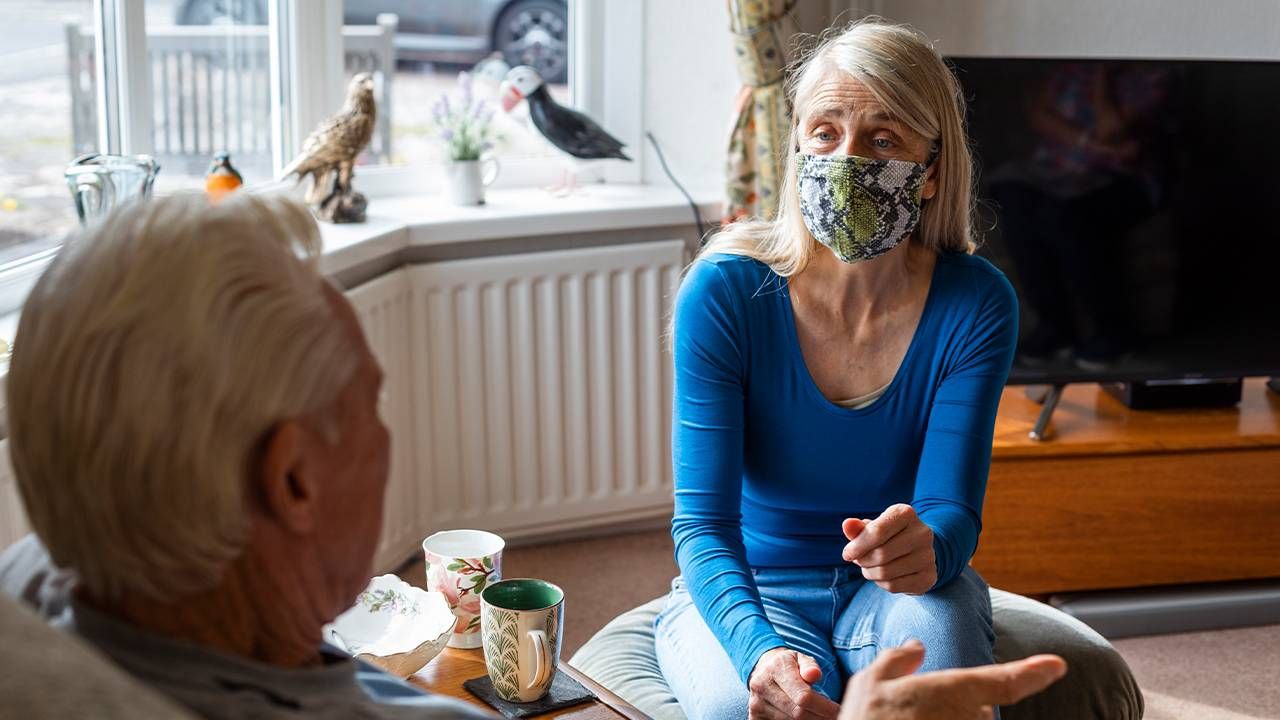The Future of Long COVID and Your Health
Long COVID is more prevalent in the older population but diagnosis can be problematic
When Maya McNulty of Niskayuna, New York tested positive for COVID in March of 2020, she experienced a gamut of symptoms including fever, chills, and headache, as well as loss of taste and smell.
"I knew instantly that I had come in contact with the virus, at the gym in the sauna," said McNulty. "It hit me like a Mack truck. I had never been so sick in my life and had no prior medical conditions."

Differences Between COVID and Long COVID
McNulty, now 49, spent time in a medically induced coma, endured a tracheostomy and was on a ventilator while in the hospital. She survived her COVID crisis, but today she still suffers with long-term effects of the COVID-19 virus, known as long COVID (also referred to as PASC, post-COVID, long-haul COVID, and others). McNulty was clinically diagnosed with long COVID in September, 2020.
There are some differences between COVID-19 (a virus) and long COVID (a syndrome).
"The difficulty in diagnosis of PASC in [the older] population is that the mental clouding can look like dementia, and the chronic fatigue may be passed off as 'old age.'"
"COVID is an acute viral infection with symptoms that are well known – including cough, fever, upper respiratory symptoms, often also with gastrointestinal symptoms. It can have flu-like aches and pains as well," said Dr. Matthew N. Bartels, professor and chairman in the Department of Rehabilitation Medicine at Montefiore Health System in an email interview. "In severe cases it can cause hospitalization, respiratory failure and death, as we all know. It can also lead to a change in coagulation that can cause clots, which can then cause heart attacks, strokes, pulmonary emboli, limb loss or skin breakdown."
"Post-Acute Sequelae of SARS CoV-2 infection (also known as long COVID) is a syndrome that occurs weeks to months after the acute infection and has symptoms that include mental fogging, persistent shortness of breath and chronic fatigue," said Bartels.
"Some people may have heart failure-like symptoms, dysfunction of the autonomic nervous system (control of heart rate, blood pressure and other self-regulation of bodily functions), as well as peripheral nerve changes and the well-known persistent loss of smell and taste. The course is persistent and chronic in PASC, as opposed to a rapid onset and usually a two to three week overall course in acute COVID," he added.
How Long COVID Affects the Older Population
A recent 2022 report from the Centers for Disease Control and Prevention has found that in the first year after being diagnosed with COVID, 25% of COVID survivors aged 65 or older had at least one condition that could be related to their previous COVID illness.
An article in the December 2022 issue of Neural Regeneration Research reports that long COVID is expected to increase in patients over the age of 65 and could have negative results on their mental health. The report states that long COVID does not result from COVID infecting the brain, but is a result of a "complex interaction between the biological and the psychosocial factors" described in the article.
Long COVID or Aging?
Bartels agrees that long COVID/PASC is highly prevalent in the older population. But diagnosis is problematic.
"The difficulty in diagnosis of PASC in [the older] population is that the mental clouding can look like dementia, and the chronic fatigue may be passed off as 'old age,'" he said. "The decline in cardiac and pulmonary function that some people experience may not be noted since it could be assumed to have been preexisting."
And it is possible that long COVID could be more severe in the older population due to underlying conditions that make the outcomes more severe, said Bartels.
"Imagine the cognitive decline seen in an individual who had some mild baseline cognitive dysfunction, or the shortness of breath in someone with preexisting emphysema or heart disease," he explains. "So, the overall impact may be more severe because the older individuals may have PASC as a second impact, which can be even more disabling."
Long COVID is now being reported in COVID survivors of any age in many populations, with symptoms sometimes mimicking other conditions.
"Memory issues are often subtle as are the other brain function issues, such as attention and decision making," Bartels said. "Fatigue is the biggest symptom, and it can look similar to chronic fatigue syndrome."
Is There Hope for Long COVID Survivors?
Despite how long we have been experiencing the pandemic, we're still in the early days of understanding long COVID, the depth and length of symptoms and their effects on the physical and mental health of patients. Although Bartels said he is not aware of long COVID directly causing depression or anxiety, the combination of symptoms can contribute to those issues and have been seen in individuals with long COVID.
"So far, most treatments are supportive and fortunately there seems to be good recovery in many individuals over time," he said. "There are no clear medications or other interventions for many of the symptoms, but therapy and support can help for some of the painful or neuromuscular symptoms. Cardiac and pulmonary rehabilitation can help for individuals with heart and lung issues. And closely monitored activity and support can help with fatigue. For the autonomic symptoms, there are similar interventions that are used for individuals with autonomic dysfunction."
How Does Long COVID Present in Vaccinated vs. Unvaccinated Patients?
"This is the million-dollar question," said Bartels. "Since individuals who are vaccinated can still catch COVID, but have much less severe disease for the most part (avoiding hospitalization, ventilator support, and death), it may be that the vaccine can lower the chance for PASC and if it occurs, make it less severe. For pulmonary and cognitive symptoms, the severity of the initial infection does seem to correlate with PASC severity and frequency. Still, anyone infected with COVID can have PASC, even those who had very mild infections. Early studies seem to indicate that the incidence of PASC in vaccinated individuals who catch COVID is much lower than in people who were not vaccinated."
"My best advice for sufferers of long COVID is to seek medical help right away. Don't wait."
McNulty is vaccinated, and notes that anyone (whether a COVID survivor or not) can receive the vaccine if they are eligible. However, the CDC recommends that eligible long COVID patients wait at least 10 days after showing symptoms to get vaccinated.
After relearning how to walk, talk, and eat normally, McNulty decided to be proactive. She started COVID Wellness Online Clinic to help other long COVID sufferers. She also founded Walking Warrior, LLC, supporting long COVID survivors and families, bolstering public education about long COVID, and advocating for improved health care service related to long COVID.
"My best advice for sufferers of long COVID is to seek medical help right away. Don't wait," McNulty says. "Don't tell all the wrong people about your symptoms because they will gaslight you. It is not in your head."
Help for Long COVID Patients
According to Bartels, since the onset of the public health emergency (PHE) and the recent federal mandates, including the Executive Directive by President Biden in the beginning of May, there is good coverage for individuals to be evaluated for PASC. Pulmonary rehabilitation is now covered for PASC and the treatments for autonomic dysfunction and cardiac issues are also covered.
"A larger issue was access to care, and this may still exist for many people. However, a large number of PASC clinics are now opening, either as a unified multidisciplinary clinic in one space, or as a team of health care professionals working together to meet the needs of the patients," explained Bartels.
"If you believe you may have PASC, you should see your health care provider and start an evaluation," he said.
5 Long COVID Resources
- Guidance on long COVID as a disability under the ADA, Section 504, and Section 1557
- Financial assistance if you have COVID
- Survivor Corps Post COVID Care Centers
- COVID debt relief for veterans
- Post COVID conditions for health care providers


